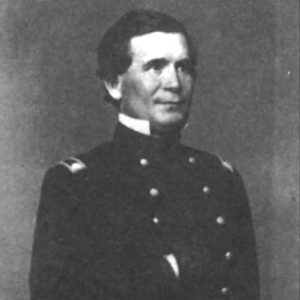calsfoundation@cals.org
James Totten (1818–1871)
James Totten was an officer in the U.S. Army and was the commander of the Little Rock Arsenal during the Arsenal Crisis of 1861. He later served in the Civil War, commanding units in both the Trans-Mississippi and Western theaters.
James Totten was born on September 11, 1818, in Pittsburgh, Pennsylvania. His father, William E. Totten, was a doctor who later served at the Little Rock Arsenal and had a private practice; there is no information on Totten’s mother or siblings.
He attended the U.S. Military Academy at West Point, graduating in 1841. Commissioned a second lieutenant, he was promoted to first lieutenant in 1847. In 1849–50, Totten served in Florida to help suppress the Seminole Indians. Totten was promoted to the rank of captain in 1855, and in 1857–58, he intervened in the Bloody Kansas conflict. In 1860, Totten expelled non-Indians from reserves in Kansas.
In November 1860, Totten and sixty-five men were transferred to occupy the Little Rock Arsenal. The Little Rock Arsenal was previously unmanned, and the arrival of the Federal troops in the city created unrest in the Delta region of the state, most notably in Helena (Phillips County). Militia units from around the state offered their services to take control of the arsenal but were turned down by the adjutant-general of the Arkansas militia. Governor Henry Rector informed Totten on January 28, 1861, that neither reinforcements nor the removal of any weapons from the arsenal would be tolerated. Totten replied to the governor that he reported to the Federal government and not the State of Arkansas. Militia groups from across Arkansas began to arrive in the capital city at this time and prepared to stop any possible reinforcement of the arsenal. The Little Rock City Council demanded that the governor take control of the units and prevent an assault on the arsenal. Rector replied that he did not have any authority over the groups. The council replied by calling out the Capital Guards, a Little Rock (Pulaski County) militia unit. By February 6, the governor convinced Totten to surrender the arsenal to the troops. Totten agreed, as he had not received any instructions from his superiors. On February 8, Totten and his men were escorted from the arsenal. On February 12, Totten and his men boarded a ship to St. Louis, Missouri. While he waited to leave the city, Totten received a sword presented by the ladies of the city in honor of his conduct during the crisis. By avoiding any conflict, Totten earned the respect of the citizens of Little Rock and his superiors, who allowed him to remain in command of his battery.
Totten served in Missouri during the opening days of the Civil War, participating in actions at Camp Jackson and the Battle of Wilson’s Creek. He continued to serve in both staff and field commands in the Trans-Mississippi and Western theaters. Totten also served as the inspector-general of the Military Division of the Atlantic. He was brevetted to the rank of brigadier general in the U.S. Army and promoted to the same rank in the Missouri Militia. At the conclusion of the war, Totten returned to his regular rank of lieutenant colonel; he retired from the army in 1870. His son, Charles Adelle Lewis Totten, graduated from West Point and became a respected author.
Totten died on October 1, 1871, in Sedalia, Missouri, and is buried in Crown Hill Cemetery.
For additional information:
Dougan, Michael B. Confederate Arkansas: The People and Policies of a Frontier State in Wartime. Tuscaloosa: University of Alabama Press, 1995.
Moneyhon, Carl. The Impact of the Civil War and Reconstruction on Arkansas: Persistence in the Midst of Ruin. Baton Rouge: Louisiana State University Press, 1994.
David Sesser
Henderson State University
 Military
Military Pulaski Light Artillery Battery (CS)
Pulaski Light Artillery Battery (CS) James Totten
James Totten 



Comments
No comments on this entry yet.